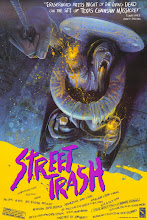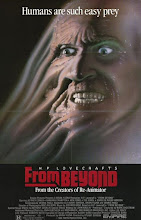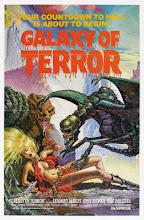
Cyberspace. A consensual hallucination experienced daily by billions of legitimate operators, in every nation, by children being taught mathematical concepts... A graphic representation of data abstracted from banks of every computer in the human system. Unthinkable complexity. Lines of light ranged in the nonspace of the mind, clusters and constellations of data. Like city lights, receding...
Reading those words in 1985, I had no idea how prophetic they would become. William Gibson's Neuromancer was a life changing novel for me, opening my world to a whole universe of ideas about the potential of computers and the power of information; our relationship with (and addiction to) technology; and very plausible speculation about a future of post-human evolution through neural augmentation. It isn't hard now to imagine us becoming so immersed in our tech that it becomes an extension of ourselves. I'm already completely dependent on my computer for access to music, movies, comics, news, communication, creativity, stimulation, relaxation.Last night Fangoria reported that the reigns of the floundering Neuromancer adaption have been handed over to one of the most visionary and intelligent film-makers working today - Vincenzo Natali. This is very exciting news, and if you have any doubt about his suitability for the project, check out his cult cyberpunk sleeper Cypher.I'd all but lost hope for a good Neuromancer film, because last year the direction it was heading in was looking very, very dire. Some complete hack of a director attached; that no-talent nancy-boy from the Star Wars prequels cast as Case and some pre-production art that made it look like some kind of horrible steampunk abortion. Uuuuurrgh.The question is: can Neuromancer still be relevant in a world where Gibson's ideas have been so ruthlessly pillaged by every facet of our culture for 25 years (technology, design, philosophy, fashion, movies like The Matrix, eXistenZ, Sleep Dealer, Ghost In The Shell, etc)? In a world where so many of his once fantastic concepts have more or less passed into the realm of the banal? A world where the legacy of the great cyberpunk writers - Rudy Rucker, Bruce Sterling, Jack Womack, Neal Stephenson and their progenitors PKD, Alfred Bester, Ballard and Burroughs - is sullied by those shamefully idiotic steampunk ninnies? Not to mention the whole cyberpunk "sub-culture", which has always been a pathetically sad affair (art is art, why do people need to pretend it's real?).
With Natali at the helm (and rewriting the screenplay), I think Neuromancer could be subtly tweaked into something that is once again cutting edge SF. Last year's brilliant Mexican indie
Sleep Dealer, Duncan Jones' upcoming Source Code and this year's mega budgeted Inception prove that we're still fascinated with the concepts that lie at the heart of cyberpunk.
After all, although much of Gibson's Sprawl series is now hopelessly dated, the essence of it still looks like a future that we're moving towards (corporate supremacy, sensory immersion in technology, physical/neural modification, AI, over-population, environmental disaster - dystopia).But where does all this leave Natali's long mooted adaption of J.G. Ballard's High-Rise?




































_poster.jpg)
































































